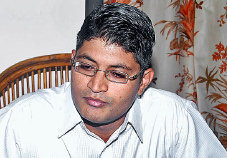(HOT) UPSC Current Affairs 2025 PDF
NEW! The Gist (NOV-2025) | E-BOOKS
(Interview) IAS topper chose rural India over Harvard | Karthik Adapa (Topper, IAS 2008)
This IAS topper chose rural India over Harvard
 A
doctor by profession, Karthik Adapa gave up scholarships to Harvard and
Cambridge to join the Indian Administrative Services. Thinking beyond marks,
appreciating the value of each subject and teaching these very subjects to
students during his preparation helped him ace the exam.Now stationed at
Ranikhet, a small town in Uttarakhand , Karthik (who was ranked first in the IAS
exam of 2008) aspires to make a difference by working at the grassroots...
A
doctor by profession, Karthik Adapa gave up scholarships to Harvard and
Cambridge to join the Indian Administrative Services. Thinking beyond marks,
appreciating the value of each subject and teaching these very subjects to
students during his preparation helped him ace the exam.Now stationed at
Ranikhet, a small town in Uttarakhand , Karthik (who was ranked first in the IAS
exam of 2008) aspires to make a difference by working at the grassroots...
Why did you opt for the IAS?
It offers a tremendous opportunity for leadership and to work at the
grassroots level. For example, I now work in a small town with a population of
around 20,000. It is such a backward region that even a little work we do has a
tremendous impact on the people here. You also get a chance to impact people's
lives across a variety of domains such as health, education, water, sanitation,
roads and electricity. In fact, as a topper, I was given the option to go to my
hometown in Khammam, Andhra Pradesh but I chose Ranikhet as it's a much more
backward place and that's the kind of place I wanted to contribute to.
Medicine is considered a noble profession. What prompted you to move out
of it?
I enjoyed being a doctor and in fact, continue to be a doctor even now. In
my capacity as an administrator, I organise health camps, where I also serve as
a doctor. But what I realised is that as a doctor, the canvas you get to paint
on is very small. Health is the only field you can work in as a doctor.
Tell us about life as a student...
I was always a good student, which helped me secure admission to a national
medical college. I got a scholarship for a postgraduation at both Harvard and
Cambridge. I also got a Bill & Melinda Gates Foundation scholarship for a PhD in
Molecular Medicine at Harvard and the Jawaharlal Nehru Memorial Trust
Commonwealth Shared Scholarship for my PhD in Cambridge. But I opted for the IAS.
In two earlier attempts, I also got through the Indian Police Services, but I
let it pass, too.
Three attempts? It sounds taxing! How did you prepare?
I enjoyed the process. I wish I had to give ten attempts so I could study
for ten years! You actually grow a lot in the process; the reading is voracious.
I look upon it as a way of life and not much has changed since those times for
me. I still read a lot, keep abreast of what's happening in the world, in the
country, in my state.
Which subjects did you chose during the mains and why?
Zoology and Psychology. Having done medicine, which is Advanced Biology, I
wanted to go back to my basics and study Zoology, which is Basic Biology. I also
wanted to study one subject that was different and would tell me something I
enjoy in life and Psychology fitted the bill well. I worked really hard in
Psychology. Though I didn't score too well, it gave me new perspectives to see
my life events. It brings about a holistic change in your personality, which
happens as long as you don't study merely for marks but internalise the subject.
You must appreciate the basics of the subject and study its varied topics.
How did you prepare for the exam?
I referred to basic textbooks like Morgan & King and Barrons. Then you have
advanced textbooks for each subject; Coleman for Abnormal Psychology, Pearson's
for Education Psychology. I would devote six to eight hours a day, but more than
the number of hours, it is the quality and consistency of your studies that
matter. I used to be very consistent with my reading.

